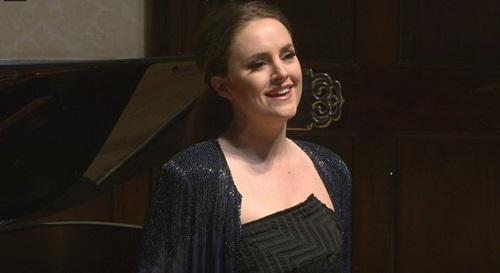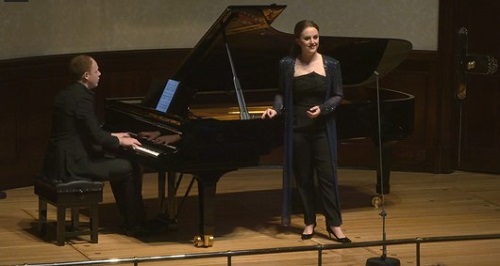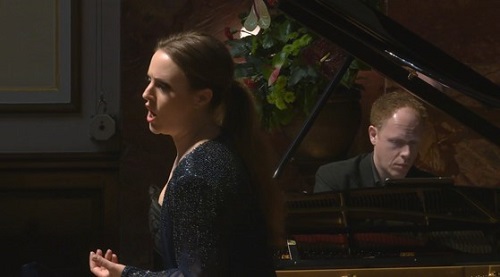Louise Alder’s lunchtime recital at Wigmore Hall, with pianist Joseph Middleton, was almost operatic in its scope and emotional energy. And, Alder showed her fearlessness by opening her programme with Amy Beach’s Three Browning Songs, commissioned by the Browning Society of Boston to whom they are dedicated, which consistently push the voice high and have ecstatic vocal climaxes that require careful structuring and control. Alder was more than equal to the challenges, confidently occupying the high tessitura, treating Beach’s frequent text repetitions with insight, and demonstrating adroit control of colour and timbre.
‘The year’s at the spring’ was full of joy, the piano’s passionate harmonisations seeming to send the vocal line flying in rapturous rejoicing, “God’s in his heaven –/ All’s right with the world”. No wonder Middleton allowed himself a smile at the piano’s euphoric conclusion. In contrast, the wistfulness of ‘Ah, Love, but a day’ was signalled by the gentle, meandering reflectiveness of Middleton’s introductory chords, and Alder captured the poignancy of the repetitions, “Ah, Love”, as the poet-speaker laments the love that changes and fades: “Summer has stopped.” The heightened emotions of the second stanza were affectingly shaped, tentative optimism conveyed in the closing question, “Ah, Love, look in my eyes, wilt thou change too?”, even while doubt lingered in the hovering vocal cadence and Middleton’s delayed resolution. ‘I send my heart to thee!’ rippled with energy. Alder conjured real drama and thrill when rising to the climactic Bb, with the image of the lover’s face which “May light my joyous heart to thee, to thee in its dwelling place”, and found warmth in the descent of the closing repetition of the song’s initial vow.

After this American opening, the central part of the recital travelled across Europe, beginning with Leipzig and Clara Schumann’s three Op.12 songs – songs which offer strong evidence for those who argue that, as a composer, Clara was very much the equal of her husband, Robert. ‘Er ist gekommen’ also attests to her brilliant pianism and Middleton brought the storm and rain, and the lovers’ anxiously beating hearts, into the concert hall. Again, Alder showed sensitivity to the textual repetitions and persuasively negotiated the shift in mood that comes with the arrival of spring in the final stanza. Assertive shaping of the intervallic plunges and engaging use of vocal colour captured the insistence of the poet-speaker in ‘Warum willst du and’re fragen’, as she urges her beloved to ignore the whisperings of others and look only into her eyes, which confirm her love. The closing avowal of devotion was beautifully gentle and sincere, the singer’s sentiments delicately echoed in the piano postlude. ‘Liebst du um Schönheit’ had a lovely pulsing momentum, and Alder’s melody was lyrical and lovely. When sung so truly and clearly as this, who would deny the poet-speaker’s declaration, “Dich lieb’ ich immerdar”, Middleton’s unwinding postlude once again providing consoling affirmation.
Clara Schumann stopped composing after Robert died, in 1856, and resumed her career as a pianist. Alma Mahler was stopped from composing after she married Gustav, though subsequently her husband did encourage her creative talent and expression. The three songs by Alma that we heard here are, I think, less finely crafted than Clara’s lieder, but their harmonic nuances were imaginatively conveyed by Middleton and Alder’s soprano was precise of pitch and line, particularly so in the first stanza ‘Ich wandle unter Blumen’ before the song pushed forwards tempestuously. ‘Laue Sommernacht’ ends somewhat inconclusively and pallidly, but ‘Licht in der Nacht’ has more dramatic definition and, having established a sombre gloom in the opening image of embracing black darkness, Alder and Middleton infused light and colour into the song, to complement the poet-speaker’s fragile hope of solace, a hope which reaches fervent heights. The closing stanza, though, extinguishes such hope, and the soprano dissolved the vocal line with lethargic melancholy.

The confident, imaginative impressionism of Lili Boulanger’s Clairières dans le ciel confirm what a tragic loss her death at just 24 years-old was to the musical world. Alder performed five of the collection’s thirteen songs, her warm, ample soprano bringing rich and wide-ranging emotion to Boulanger’s touching expression of love and loss. The high-lying phrases of ‘Elle était descendue au bas de la prairie’ floated, delicate but sure, both ethereal and sensuous, and Alder heightened the text discerningly, creating momentum as the protagonist climbed up through the meadow, “Bientôt, s’étant mouillée, elle gagna le haut”. Middleton swayed dreamily in “Vous m’avez regardé avec toute votre âme”, the piano’s drifting postlude wonderfully embodying the ellipsis with which Francis Jammes’s poem ends, “Que ce regard était passionné et calme …” (How this gaze was passionate and calm …).
The parlando vocal line at the start of ‘Au pied de mon lit’ was supported by the sacred stillness of the piano’s chords, but the vision of the ‘negress Virgin’ that the poet-speaker’s mother has placed at the foot of her bed engendered an ecstatic outpouring. The challenging vocal intervals and low tessitura of ‘Nous nous aimerons did not trouble Alder, whose soprano was focused and firm, capturing the protagonist’s faith in the future consummation of passion, while ‘Si tout ceci n’est qu’un pauvre rêve’ had a stirring dark quality, especially when the melody sank down with the reference to “les seules vaines voix” – the only voices, unreal ones, that adore the protagonist. Boulanger’s songs were beautifully sung. Alder created a strong sense of the immediacy of the emotions felt and Middleton finely crafted the Fauré-seque accompaniments, ever sensitive to the sudden shifts of texture and mood.

The final work in the programme took us back to America, and back to the past. Commissioned by the Marilyn Home Foundation in 2000, Libby Larsen’s Try Me, Good King recounts the ‘last words’ of the first five wives of Henry VIII, as drawn from their last letters and, in the case of Anne Boleyn and Katherine Howard, their speeches before execution. Larsen’s music, which incorporates snatches of Elizabeth lute song and repetitions of a tolling bell motif, has a prevailing dissonant anxiety, which makes the moments of softness all the more telling. Anne Boleyn’s appeal for a public trial is a startling opening, and Alder made the plunging octave, “Try me”, glisten and burn with passion, crouching low at times, as if the Queen is bowed by desperation. There was warmth, though, for Anne’s recollection of Henry’s words of love – “I would you were in my arms … for I think it long since I kissed you” – but a tentative quietness, of fear and acceptance, descended at the close and the fragmented utterance of Anne’s famous last words, “I hear the executioner’s good, and my neck is so little”, was terribly poignant.
The nursery song that follows Jane Seymour’s statement after the birth of her son, the future Edward VI, two weeks before her own death, “we be delivered … of a prince”, had a lulling gentleness, though the soaring melisma of the final line, “roses three!”, bloomed powerfully with a crystalline shine. Middleton’s jangly, jittery accompaniment underpinned the irony of Anne of Cleves’s recognition of the King’s rejection of her as a suitable wife, Alder’s delicious octave slide, “Your majesty’s most humble sister …” capturing the disingenuous of Anne’s stoical farewell. Above Middleton’s sparse tolling octaves and cool allusion to Dowland’s ‘In darkness let me dwell’, Alder imbued the narrow-ranging declamation of Katherine Howard’s last words with a pleading intensity which built with control and judgement towards the almost crazed, unaccompanied avowal, “I die a Queen, but I would rather die the wife of Culpeper”, a reference to Thomas Culpeper with whom the young consort was accused of adultery. These were colourful, characterful portrayals that showcased Alder’s convincing dramatic instincts and the flexibility and vivid richness of her soprano – the soaring loveliness of which was confirmed in Alder’s encore: Florence Price’s ‘Night’.
Claire Seymour
Louise Alder (soprano), Joseph Middleton (piano)
Amy Beach – 3 Browning Songs Op.44, Clara Schumann – ‘Er ist gekommen’ Op.12 No.1, ‘Warum willst du and’re fragen’ Op.12 No.3, ‘Liebst du um Schönheit’ Op.12 No.2, Lili Boulanger – Clairières dans le ciel (‘Elle était descendue au bas de la prairie’, ‘Vous m’avez regardé avec toute votre âme’, ‘Au pied de mon lit’, ‘Nous nous aimerons’, ‘Si tout ceci n’est qu’un pauvre rêve’) Alma Mahler – ‘Laue Sommernacht’, ‘Ich wandle unter Blumen’, ‘Licht in der Nacht’, Libby Larsen – Try Me, Good King: Last Words of the Wives of Henry VIII
Wigmore Hall, London; Monday 21st March 2022